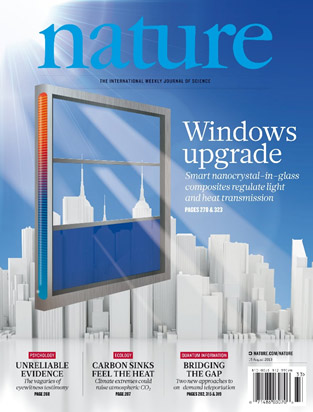Adapted from this Berkeley Lab Press Release

Researchers at the Molecular Foundry have designed a thin coating of nanocrystals embedded in glass that can dynamically modify sunlight as it passes through a window. Unlike existing technologies, the coating provides selective control over visible light and heat-producing near-infrared (NIR) light, so windows can maximize both energy savings and occupant comfort in a wide range of climates.
The work was published in the journal Nature by a team of Foundry researchers that was led by Delia Milliron and included Anna Llordés, Guillermo Garcia, and Jaume Gazquez. Milliron’s research group is already well known for their smart-window technology that blocks NIR without blocking visible light. The technology hinges on an electrochromic effect, where a small jolt of electricity switches the material between NIR-transmitting and NIR-blocking states. This new work takes their approach to the next level by providing independent control over both visible and NIR light. The innovation was recently recognized with a 2013 R&D 100 Award and the researchers are in the early stages of commercializing their technology.

